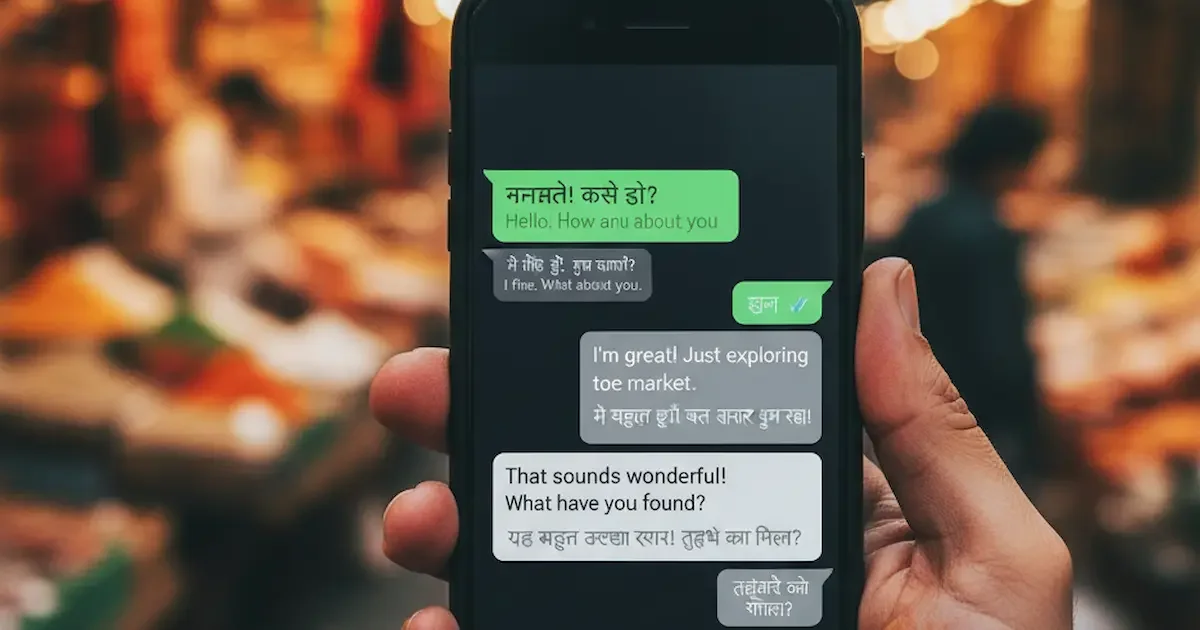WhatsApp Just Killed the Language Barrier. And Maybe a Little Bit of Your Privacy.
Let's be honest, for most of us in India, WhatsApp isn't just an app. It's the national communication backbone. It's how you get updates from the family group, argue about cricket with your friends, and run a multi-lakh rupee business from a single device. It’s the one place where your grandma, your boss, and that guy who sells you coconut water all exist.
For years, it’s had one massive, invisible wall running through it: language. You, a Tamil speaker, trying to coordinate with a vendor in Delhi. You, a Bengali, trying to understand a viral meme in Marathi. It’s a subtle friction in our hyper-connected lives.
Well, Mark Zuckerberg just decided to bulldoze that wall. Meta has officially launched a real-time, in-chat translation feature for WhatsApp, and it’s a bigger deal than you think.
So, What's the Big Idea?
The concept is beautifully simple. You type a message in your native tongue—be it Hindi, Telugu, or Punjabi. Your friend, who speaks English, receives it instantly translated into English. When they reply in English, you see it in your language.
No more copying messages, switching to the Google Translate app, pasting, translating, copying the reply, and switching back. The entire awkward, conversation-killing dance is gone. It all happens seamlessly, right there in the chat window, a tiny globe icon sitting next to your text box, ready to work its magic.
This isn't some clunky, half-baked feature. It's powered by Meta's increasingly sophisticated AI language models, the same tech they've been pouring billions into for years. The goal is to make a conversation between someone in Bengaluru and someone in Berlin feel as natural as chatting with your neighbour.
Why This Is a Game-Changer (Especially for Us)
In a country with 22 official languages and over 19,500 dialects, this feature isn't just a novelty; it's a utility.
Think about it. The sari trader in Surat can now negotiate deals with a boutique owner in Kochi without a single "lost in translation" moment. A freelance graphic designer from Pune can seamlessly collaborate with a client in France. The potential for commerce, especially for small and medium-sized businesses that thrive on WhatsApp, is immense.
Beyond business, it dissolves the everyday social barriers. It helps the kid who moved to a new city for college make friends faster. It allows a daughter-in-law to chat more freely with a mother-in-law who speaks a different language. It makes 'Digital India' feel a little less fragmented and a lot more connected.
This is, without a doubt, one of the most genuinely useful features to hit a major tech platform in years. It solves a real, universal problem.
Alright, What's the Catch? There's Always a Catch.
Look, this is Meta we're talking about. They don't give you revolutionary technology out of the goodness of their hearts. While WhatsApp chats are famously end-to-end encrypted, you have to ask the question: where is this translation happening?
If the translation process happens on Meta's servers, it means your unencrypted message is being sent to them, processed, and then sent to your friend. Even if it's for a fraction of a second, your "private" conversation is being read by a machine. And if a machine is reading it, the data from it is being used. For what? To improve the AI, sure. But also, almost certainly, to understand you better for advertising purposes across Facebook and Instagram.
Furthermore, AI translation is still not perfect. It will butcher local slang, misinterpret sarcasm, and strip away the cultural nuance that gives our languages flavour. Your heartfelt message in beautifully poetic Hindi might arrive as a sterile, corporate-sounding English sentence. Be prepared for some awkward and hilarious mistranslations.
The Bottom Line
This new real-time translation feature is a massive win for communication. It’s a practical tool that will empower millions of Indians to connect and do business in ways that were previously clunky and difficult. It’s a testament to how powerful AI can be when applied to a real-world problem.
But don't be naive. You're trading a little bit of your privacy for this convenience. You're feeding the Meta machine more data with every translated word.
So, use the feature. Let it open up your world. But do it with your eyes open. Because in Meta's universe, if the product is free, you are the product. And now, so are your conversations.
